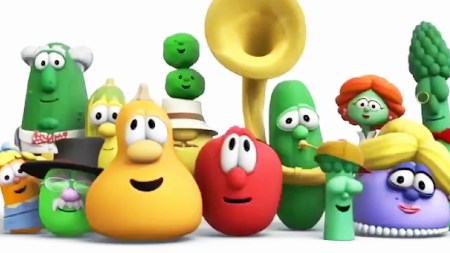'VeggieTales' is 'racist,' students claim at Cal State 'whiteness forum'

Is the children's Christian TV series "VeggieTales" racist?
Students a one California college claim that the popular show is racist because the villains are vegetables of color while the good characters are white.
The College Fix reports that Cal State San Marcos recently held its annual "Whiteness Forum," an event featuring the “myriad of ways that white supremacy remains front and center in the U.S. social and political context.”
The two-hour event featured more than a dozen poster board projects identifying how racism remains prevalent in society, including one display accusing “VeggieTales” of perpetuating racial stereotypes.
“Racial minorities were usually depicted as villains,” the project argued. “They humanize vegetables using stereotypes shown in accents and racial indicators to identify people of color in the show.”
“Many of the villains characterized by race were found to be irredeemable characters. Which is ironic because a popular theme in the Bible is Jesus’ power of the redemption of God’s children,” it continued.
The project claimed that “when kids see the good white character triumph over the bad person of color character they are taught that white is right and minorities are the source of evil.”
One student who worked on the project told reporters that the accents of the evil characters tend to sound ethnic, such as Latino, while the good characters sound white.
The project concluded that “‘VeggieTales’ and other like-minded works have made the good messages in the Bible dangerous.”
In response to the students' accusations, Eric Metaxas, a best-selling author and former "Veggie Tales" writer and narrator, told PJ Media:
"All vegetables are part of one race, even though they are of many colors. They are all descended from the same parents — the Adam and Eve of vegetables, who foolishly ate a forbidden fruit (irony?) and screwed everything up for all vegetables descended from them. At least I’m pretty sure that’s the story."
According to the event's website, the forum is a result of professor Dreama Moon’s Communications 454 class titled “The Communication of Whiteness.” The annual event serves as a showcase of students’ final projects for the class.
Other titles for projects included “White Avoidance,” “Civilized vs. Uncivilized,” “Kill the Land, Kill the Indian,” “White Women’s Role in White Supremacy,” “Gun Ownership and Racial Bias," among others.
Created in 1993, "VeggieTales" is one of the most popular Christian shows for youth and has sold over 72 million videos and 15 million books around the world. Each episode of the show tells a story based on a biblical text as it relates to modern-day scenarios. The show is narrated by Bob the Tomato, who also serves as the voice of reason for his fellow vegetables.
In 2017, the show made its way to Netflix with a fresh version titled “VeggieTales” in the House and “VeggieTales in the City.”
On his personal blog, “VeggieTales” creator Phil Vischer frequently speaks out against racism and addresses how the Church should respond to social injustice.
Ahead of the 2016 presidential election, he urged Christians to consider how the Church can “show minority communities how much we care about them, when so many of us voted for a candidate widely considered — whether accurate or not — bigoted and xenophobic.”
“Quite of few (though not all) of our minority brothers and sisters are worried that the outcome of this election reveals an America that is becoming a less friendly place for them,” he said. “We, the Church, need to convince them otherwise.”





















